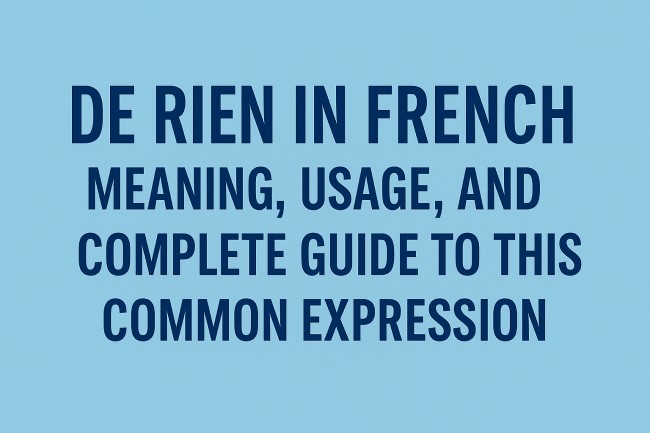De Rien in French – Meaning, Usage, and Complete Guide to This Common Expression

Introduction: Understanding “De Rien” in French
When you begin learning French, one of the first polite phrases you’ll encounter is “de rien.” It’s short, easy to pronounce, and appears everywhere—from casual conversations to television shows. Yet, behind its simplicity lies a fascinating cultural and linguistic depth.
This article explores “de rien in French,” what it means, when to use it, its alternatives, pronunciation tips, and why it remains one of the most beloved expressions in French communication. By the end, you’ll not only know how to say it, but also when and why to use it like a native speaker.
What Does “De Rien” in French Mean?
At its core, “de rien” in French means “you’re welcome.”
However, the literal translation is “of nothing” — de means “of” and rien means “nothing.” When a French person says “de rien,” they’re modestly expressing that what they did was “nothing” or “not a big deal.”
For example:
-
Merci ! → Thank you!
-
De rien ! → You’re welcome! (literally “It’s nothing!”)
This reflects a key aspect of French politeness — humility. The speaker implies that the help or favor required little effort, maintaining a sense of grace and modesty.
The True Spirit of “De Rien”
A Polite and Friendly Response
In daily conversation, “de rien” is the standard, neutral way to respond to “merci.” It’s neither overly formal nor too casual, which makes it extremely versatile. You can use it with friends, colleagues, or even strangers.
A Reflection of French Culture
Politeness in French often involves understatement. While English speakers may emphasize gratitude (“You’re very welcome!”), the French prefer a more subtle expression. Saying “de rien” is like saying, “No problem,” or “It was nothing at all,” in a calm and understated way.
Common Situations Where It’s Used
-
When someone thanks you for holding a door.
-
When a friend appreciates your help with homework.
-
When a customer says “merci” after you hand them change.
In all these cases, “de rien” fits naturally.
Grammar Breakdown: Understanding the Words
Meaning of “De”
In French, “de” means “of” or “from.” It connects nouns, showing possession or origin.
Example: un verre de vin (a glass of wine).
Meaning of “Rien”
Rien means “nothing” and comes from the Latin word rem (thing). It’s often used in negative expressions like je ne sais rien (“I know nothing”).
Combined Meaning
When combined, de rien literally translates as “of nothing,” which metaphorically means, “There’s nothing to thank me for.” This blend of grammar and humility gives the phrase its elegance.
Alternatives to “De Rien” in French
While “de rien” is perfectly acceptable, the French language offers many ways to say “you’re welcome,” each carrying its own tone and level of formality.
Je t’en prie / Je vous en prie
-
Meaning: “You’re welcome” (formal or polite)
-
Use je t’en prie with friends or peers and je vous en prie in professional or formal settings.
-
Slightly more courteous and refined than de rien.
Pas de quoi
-
Meaning: “Don’t mention it” or “No problem.”
-
Informal and commonly used in casual conversations.
-
Perfect for friendly, relaxed situations.
Avec plaisir
-
Meaning: “With pleasure.”
-
Warm and genuine — shows you were happy to help.
-
Often used in service industries or friendly exchanges.
Ce n’est rien
-
Meaning: “It’s nothing.”
-
Informal but still polite, similar in tone to de rien.
C’est moi qui vous remercie
-
Meaning: “It’s I who thank you.”
-
Used when you want to emphasize gratitude back to the other person.
-
Common in formal settings or when you wish to sound particularly courteous.
How to Pronounce “De Rien” Correctly
Pronunciation matters in French, and “de rien” is no exception.
Phonetically, it is pronounced /də ʁjɛ̃/.
Here’s a breakdown:
-
De → sounds like “duh” but softer.
-
Rien → a nasal sound, pronounced roughly like “ree-ehn,” with the “n” not fully pronounced.
Tip: Keep your lips slightly rounded when saying “rien,” as French nasal vowels come from the nose, not the mouth.
When Not to Use “De Rien”
Even though it’s common, “de rien” isn’t always the best fit.
In Very Formal Settings
In business meetings, ceremonies, or formal emails, “je vous en prie” is preferred. It carries more respect and polish.
In Professional Communication
When writing to a superior, client, or teacher, avoid de rien — it can sound overly casual. Opt for “je vous en prie” or “avec plaisir.”
In Written French
While acceptable in text messages or casual emails, de rien may feel too informal in official correspondence.
The Cultural Importance of Modesty in French Language
French politeness revolves around balance — expressing gratitude without exaggeration. When you say “de rien,” you’re subtly implying humility: you did a favor, but it wasn’t burdensome.
This reflects broader French social norms where understatement is appreciated more than grand gestures. Instead of overemphasizing one’s good deed, the speaker simply says, “It was nothing.” It’s a way to remain polite while downplaying one’s own effort — a truly French quality.
Related Keywords and Meanings
When people search for “de rien in French means,” they often want clarity about its translation and usage. Let’s break that down.
De Rien in French Means
-
Literally: Of nothing.
-
Figuratively: You’re welcome.
-
Emotionally: Don’t worry about it; it’s no trouble.
Other Related Phrases
-
Merci beaucoup → Thank you very much.
-
Ce n’est pas grave → It’s not a big deal.
-
Tout le plaisir est pour moi → The pleasure is all mine.
Understanding these related phrases helps you sound more natural and contextually aware when speaking French.
Tips to Use “De Rien” Like a Native Speaker
-
Keep it simple: Don’t overthink it — “de rien” works in most casual situations.
-
Mind the tone: Say it with a friendly smile; tone conveys as much as words.
-
Adapt to the setting: Use je vous en prie for formal moments, pas de quoi with friends.
-
Listen to natives: Watching French films or TV shows helps you catch when and how de rien is used.
-
Avoid overusing it: If someone offers a deep or emotional thanks, choose a warmer response like avec plaisir.
Conclusion: Mastering “De Rien” in Everyday French
The phrase “de rien in French” might seem simple, but it carries a deep sense of humility, warmth, and everyday politeness. Literally meaning “of nothing,” it shows that a favor or act of kindness wasn’t a burden — just a natural gesture of goodwill.
Whether you’re chatting with friends in Paris, emailing a colleague, or responding to a polite “merci,” de rien remains your go-to expression for everyday courtesy.
Understanding “de rien in French means” more than just translating words — it’s about embracing the cultural rhythm of French communication: effortless kindness, quiet modesty, and a touch of charm.



